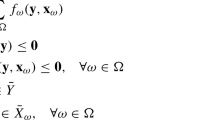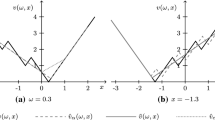Abstract
This paper is concerned with implementational issues and computational testing of bounds-based approximations for solving two-stage stochastic programs with fixed recourse. The implemented bounds are those derived by the authors previously, using first and cross moment information of the random parameters and a convex-concave saddle property of the recourse function. The paper first examines these bounds with regard to their tightness, monotonic behavior, convergence properties, and computationally exploitable decomposition structures. Subsequently, the bounds are implemented under various partitioning/refining strategies for the successive approximation. The detailed numerical experiments demonstrate the effectiveness in solving large scenario-based two-stage stochastic optimization problems throughsuccessive scenario clusters induced by refining the approximations.
Similar content being viewed by others
References
H. Attouch and R.J.-B. Wets, “Approximation and convergence in nonlinear optimization”, in: O. Mangasarian, R. Meyer and S. Robinson, eds.,Nonlinear Programming 4 (Academic Press, New York, 1981) pp. 367–394.
J.R. Birge and R.J.-B. Wets, “Designing approximation schemes for stochastic optimization problems, in particular for stochastic programs with recourse,”Mathematical Programming Study 27 (1986) 54–102.
S.P. Bradley, A.C. Hax and T.L. Magnanti,Applied Mathematical Programming (Addison-Wesley, Reading, MA, 1977).
N.C.P. Edirisinghe, “New second-order approximations in stochastic linear programming,” Working Paper, College of Business, University of Tennessee (1993); to appear inOperations Research.
N.C.P. Edirisinghe and W.T. Ziemba, “Bounds for two-stage stochastic programs with fixed recourse”,Mathematics of Operations Research 19 (1994) 292–313.
N.C.P. Edirisinghe and W.T. Ziemba, “Bounding the expectation of a saddle function, with application to stochastic programming”,Mathematics of Operations Research 19 (1994) 314–340.
N.C.P. Edirisinghe and G.-M. You, “Second-order scenario approximation and refinement in optimization under uncertainty”,Annals of Operations Research 64 (1996) 143–178.
Y. Ermoliev and R.J.-B. Wets,Numerical Techniques for Stochastic Optimization (Springer, New York, 1988).
K. Frauendorfer, “SLP problems: Objective and right-hand side being stochastically dependent—Part II,” Manuscript, IOR, University of Zurich (1988).
K. Frauendorfer,Stochastic Two-Stage Programming (Springer, Berlin, 1992).
K. Frauendorfer and P. Kall, “A solution method for SLP problems with arbitrary multivariate distributions—The independent case”,Problems of Control and Information Theory 17 (1988) 177–205.
C.C. Huang, W.T. Ziemba, and A. Ben-Tal, “Bounds on the expectation of a convex function of a random variable: With applications to stochastic programming”,Operations Research 25 (1977) 315–325.
P. Kall,Stochastic Linear Programming (Springer, Berlin, 1976).
P. Kall, “Stochastic programming with recourse: Upper bounds and moment problems—A review”, in: J. Guddat, P. Kall, K. Lommatzsch M. Vlach and K. Zimmermann, eds.,Advances in Mathematical Optimization and Related Topics (Akademie Verlag, Berlin, 1988) pp. 86–103
P. Kall and E. Keller, “GENSLP: A program for generating input for stochastic linear programs with complete fixed recourse”, Manuscript, Institut für Operations Research der Universität Zürich, Zürich CH-8006, Switzerland (1985).
R. Van Slyke and R.J.-B. Wets, “L-shaped linear programs with application to optimal control and stochastic optimization”,SIAM Journal on Applied Mathematics 17 (1969) 638–663.
R.J.-B. Wets, “Convergence of convex functions, variational inequalities and convex optimization problems”, in: R.W. Cottle, F. Giannesi and J-L. Lious, eds.,Variational Inequalities and Complimentary Problems (Wiley, New York, 1980) pp. 375–403.
R.J.-B. Wets, “Stochastic programming: Solution techniques and approximation schemes”, in: A. Bachem, M. Groetschel and B. Korte, eds.,Mathematical Programming: State-of-the-art (Springer, Berlin, 1982) pp. 566–603.
Author information
Authors and Affiliations
Corresponding author
Rights and permissions
About this article
Cite this article
Edirisinghe, N.C.P., Ziemba, W.T. Implementing bounds-based approximations in convex-concave two-stage stochastic programming. Mathematical Programming 75, 295–325 (1996). https://doi.org/10.1007/BF02592157
Received:
Revised:
Issue Date:
DOI: https://doi.org/10.1007/BF02592157




